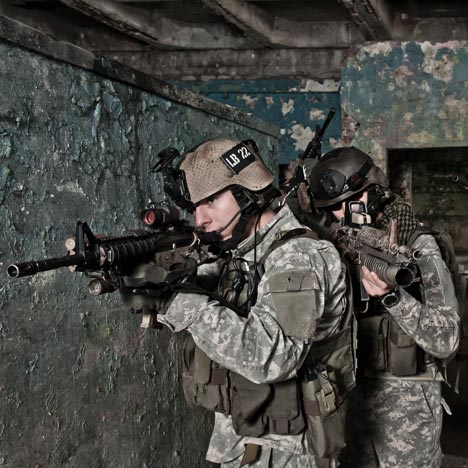
US military invests in 3D printing on the frontline
News: the US military is developing its own 3D printers for the frontline which will enable soldiers to quickly and cheaply produce spare parts for their weapons and equipment.
By bringing the new technology to the battlefield, troops will be able to produce spare parts for sensitive equipment, such as GPS receivers and air drones, without having to wait weeks for new deliveries.
"Parts for these systems break frequently, and many of them are produced overseas, so there's a long lead time for replacement parts," said operations research analyst D. Shannon Berry in a statement.
"Instead of needing a massive manufacturing logistics chain, a device that generates replacement parts is now small and light enough to be easily carried in a backpack or on a truck," he added.
The Future Warfare centre at Space and Missile Defense Command in Alabama has been developing its own 3D printers as an alternative to the more expensive printers available commercially. Early versions of its printer have cost just under $700 each, compared to at least $2,000 for commercial models.
The 3D printers are now being rolled out to the frontline in shipping containers that act as mobile production labs. The first of the $2.8m labs, which contains 3D printers and CNC machines to make parts from aluminium, plastic and steel, was sent to Afghanistan in July this year. While there are no plans to print weapons from scratch, the labs could produce spare parts to repair them, according to Pete Newell, head of the US army's Rapid Equipping Force.
The military developments mirror similar advances claimed by amateur gun enthusiasts in recent months, with a group of libertarian activists in the US releasing blueprints for 3D printed weapons, while another hobbyist announced the successful firing of a semiautomatic AR-15 rifle using 3D-printed parts.
Following that news, Ronen Kadushin, a pioneer of the open design movement, told Dezeen that advances in 3D printing could allow people to "print ammunition for an army". "Nobody will kill anybody with a 3D printed gun soon, I hope. But in the future, you don’t know," he warned.
The technology has also been taking off in civilian manufacturing, with President Obama investing $30m of government money in a national 3D printing centre in Youngstown, Ohio this August. The National Additive Manufacturing Innovation Institute is part of a military-led public-private partnership to research the possibilities of mass-producing machine parts.
We've been covering the latest developments in 3D printing as the technology proliferates through the design world. In a recent interview with Dezeen, Janne Kyttanen, co-founder of design studio Freedom of Creation and creative director of 3D printer company 3D Systems, predicted that consumers would soon be able to save money by printing products at home rather than shopping for them, while MakerBot Industries CEO and co-founder Bre Pettis told Dezeen that cheap 3D printers would place manufacturing back in the home, as it was before the industrial revolution.
See all our stories about 3D printing »
Photograph is from Shutterstock.